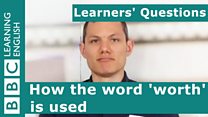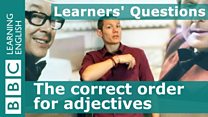Unit 8: English You Need
Exams, news, pronunciation, teachers' tips, learners' questions
Select a unit
- 1 English You Need
- 2 English You Need
- 3 English You Need
- 4 English You Need
- 5 English You Need
- 6 English You Need
- 7 English You Need
- 8 English You Need
- 9 English You Need
- 10 English You Need
- 11 English You Need
- 12 English You Need
- 13 English You Need
- 14 English You Need
- 15 English You Need
- 16 English You Need
- 17 English You Need
- 18 English You Need
- 19 English You Need
- 20 English You Need
- 21 English You Need
- 22 English You Need
- 23 English You Need
- 24 English You Need
- 25 English You Need
- 26 English You Need
- 27 English You Need
- 28 English You Need
- 29 English You Need
- 30 English You Need
Session 5
Learners' Questions
Welcome to Learners' Questions - the series where we answer your queries about the English language. What will this week's learner question be?
Activity 1
Learners' Questions
Be likely to
Daniela in Italy says: I am very uncertain how to use the form be likely to.
Watch the video and complete the activity

Dan
Hi guys! Dan for BBC Learning English here with this week's Learner Question. Find out what it is after this.
OK! This week's learner question comes from Daniela in Italy, who says, I am very uncertain how to use the form be likely to. Which degree of probability does it express?
In English there are many verbs and phrases to express possibility or probability. Examples are may, might, and could. When we use be likely to we talk about the possibility of something happening, and we often refer to possible future events. For example, the American is likely to win the race tomorrow.
When we use the phrase be likely to, we feel confident that something will happen, but we are not one hundred percent certain. We think something is possible, but we cannot be completely sure.
The opposite of likely is unlikely, and I think the phrase be unlikely to is probably used more often, perhaps because people are rather pessimistic about the future these days. Consider the example, England are unlikely to win the World Cup any time soon. It’s sad but it’s true.
Finally, the phrase be likely to or be unlikely to can also be used in the past. You just need to change the verb to be. For example, Sarah was unlikely to have known that her boyfriend was a criminal when she first met him. Poor Sarah.
I hope that answers your question Daniela. Thank you very much for writing to us. If anybody else out there has a question for Learners’ Questions, you can email us on: learning.english@bbc.co.uk. Please remember to put Learners’ Questions in the subject box and your name and the country that you’re writing from. We can’t answer all the questions, guys, because we just get too many, but we do read every single one of them. And, for more information, go to our website: bbclearningenglish.com. I think that’s about it for this week’s Learners’ Questions. I’ll see you next time. Bye.
___________________________________________________________________
Did you like that? Why not try these?


 _____________________________________________________________________________
_____________________________________________________________________________
Summary
Be likely to
We use be likely to to talk about the possibility of something happening, often in connection with the future.
When we say be likely to, we are confident that something will happen, but we cannot be 100% sure.
The American is likely to win the race tomorrow.
It’s likely to rain on Tuesday.
Be unlikely to
The opposite of likely is unlikely. The opposite of be likely to is be unlikely to. This means we are confident that something will not happen.
England are unlikely to win the world cup.
He’s unlikely to pass his exams.
Past
Be likely to and be unlikely to can be used in the past. Change the verb be. We usually use a perfect form after.
Sarah was unlikely to have known that her boyfriend was a criminal when she met him.
My father was unlikely to have lost his wallet in his own house.
To do
Try our quiz to see what you've learned about this topic.
Learners’ Questions Quiz
4 Questions
Decide if these sentences are correct or incorrect
Help
Activity
Decide if these sentences are correct or incorrect
Hint
Check the verb phrase very carefullyQuestion 1 of 4
Help
Activity
Decide if these sentences are correct or incorrect
Hint
This person seems confident of victory. Have they used the correct form?Question 2 of 4
Help
Activity
Decide if these sentences are correct or incorrect
Hint
This sentence uses was likely to. Is that past, present or future?Question 3 of 4
Help
Activity
Decide if these sentences are correct or incorrect
Hint
Is the verb phrase correct?Question 4 of 4
Excellent! Great job! Bad luck! You scored:
End of Session 5
Well, that's it for this unit! Join us again in Unit 9 for more Exam Skills, News Review, Pronunciation in the News, The Teachers' Room and Learners' Questions!
Session Vocabulary
Be likely to
Talks about the possibility of something happening
Often talks in connection with the future.
Means we are confident of something, but not 100%
The opposite of be likely to is be unlikely to
Can be used in the past. Change the verb be and follow with the perfect form